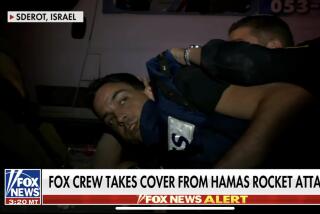NETWORKS BICKER OVER ABC’S GLASS COVERAGE
- Share via
NEW YORK — When former ABC correspondent Charles Glass was freed from his captors in Lebanon, he talked only to ABC, and that irked the other networks. ABC in turn is furious that CBS anchor Dan Rather seemed to question whether Glass was really kidnaped at all.
On the “CBS Evening News” broadcast Tuesday night, Rather referred to Glass as “a young American who says he was a hostage.”
“I actually jumped when I heard that and looked around the room to see if anybody else heard,” said Jeanee von Essen, CNN vice president of foreign news. “Several other people were staring at the monitor. They had had same reaction I did.”
ABC’s Ted Koppel, who conducted the long interview with Glass for “World News Tonight” and “Nightline,” called Rather’s remark “beneath contempt.”
Glass has said he doubted Iran had allowed him to escape, as has been theorized in Washington and Damascus. But no one had questioned that he was kidnaped, along with the son of the Lebanese defense minister, who later was released.
A few weeks after his abduction two months ago, a videotape broadcast in Beirut showed Glass reading a statement written by his captors.
“If Rather is saying Glass in some way concocted his kidnaping, I find that to be an outrage,” Koppel told Newsday. “Either Rather did not write that himself and did not read the script before he went on the air, or he has lost all sense of proportions.”
Rather went on vacation Wednesday and was not available for comment, but “CBS Evening News” executive producer Tom Bettag told Newsday the circumstances of Glass’ abduction were “murky” and Rather’s remarks were a “qualification” of the story.
Officials at CBS, NBC and CNN, meanwhile, complained about ABC’s exclusive access to Glass, who had left ABC to write a book on the Middle East.
“They get their own employee, who thankfully gets out of that mess over there, then they plaster ‘ABC Exclusive’ all over the screen,” said Marty Ryan, executive producer of NBC’s “Today” show, which he says was denied access to Glass. “They’re really shameless about how they self-promoted this.”
The other networks complained that ABC bought up all the satellite transmission time from Damascus, Syria.
“NBC Nightly News” executive producer William Wheatley said Glass had agreed to an interview with Garrick Utley, “but ABC denied us the usual courtesy of using the satellite.”
“You just can’t have that kind of a situation, or things would deteriorate to whoever’s able to buy the satellite can transmit the news. Satellite time is limited, and there has to be sharing or there’s chaos.”
NBC did eventually transmit a brief interview with Glass.
Robert Murphy, ABC vice president for news operations, says ABC released the satellite as soon as its interview with Glass ended. After that, Glass was on his own, “if he wanted to do interviews with 100 organizations.”
“It seems like anytime anybody makes a clean kill, there’s a lot of squealing that isn’t very professional,” Murphy said.
He said what the other news organizations really wanted was two-way interviews with anchors back in the United States, for which they needed both satellite access and the facilities at the only television station in Damascus. ABC had block-booked both as soon as it heard Glass was free.
Von Essen recalled that CNN allowed access to its Beirut bureau chief, Jeremy Levin, when he escaped from or was released by his kidnapers after a year in captivity.
But she said ABC officials in Damascus “made it extremely apparent that Charlie was going to serve ABC first and then the rest of the world.”
CNN also eventually got an interview with Glass.
“The next thing I knew about was when we checked the possibility of feeding the tape to London (the relay point from Damascus), the London bureau called and said, ‘Oh, my God. ABC has booked all the satellite time and won’t let anyone else feed.’ I said, ‘That can’t be.’ ”
Von Essen said she complained to ABC in New York and eventually the network allowed CNN onto the satellite.
“We didn’t get it until fairly late in the satellite time, but we basically got what we needed,” she said.
More to Read
The biggest entertainment stories
Get our big stories about Hollywood, film, television, music, arts, culture and more right in your inbox as soon as they publish.
You may occasionally receive promotional content from the Los Angeles Times.










